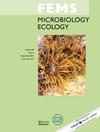根瘤噬菌体在土壤健康中的作用
IF 3.5
3区 生物学
Q2 MICROBIOLOGY
引用次数: 0
摘要
虽然 "同一健康 "框架强调了土壤微生物群对植物和人类健康的重要性,但其中一个最多样化、最丰富的群体--细菌病毒(即噬菌体)却被忽视了。本视角回顾了噬菌体对根圈植物健康的重要意义,并探讨了它们对土壤生态系统的生态和进化影响。我们首先从养分循环、自上而下的密度调节和病原体抑制等方面总结了目前我们对土壤微生物群中噬菌体的多样性和生态作用的理解。然后,我们将探讨噬菌体如何通过促进水平基因转移、编码可提高宿主细菌适应性的辅助代谢基因以及选择抗噬菌体突变体来推动土壤中细菌的进化,而这些突变体又会因权衡病原体的竞争力和毒力而改变生态。最后,我们探讨了土壤生态系统中噬菌体研究的挑战和途径,以及未来如何阐明噬菌体对微生物生态学和进化以及土壤生态系统功能的意义。我们的结论是,与细菌类似,噬菌体可能在连接不同的 "一个健康 "分区、影响土壤中微生物组的多样性和功能方面发挥着重要作用。从应用的角度来看,噬菌体可以提供新的方法来调节和优化微生物以及微生物与植物之间的相互作用,从而增强土壤健康。本文章由计算机程序翻译,如有差异,请以英文原文为准。
The role of rhizosphere phages in soil health
While the One Health framework has emphasized the importance of soil microbiomes for plant and human health, one of the most diverse and abundant groups—bacterial viruses, i.e. phages—has been mostly neglected. This perspective reviews the significance of phages for plant health in rhizosphere and explores their ecological and evolutionary impacts on soil ecosystems. We first summarize our current understanding of the diversity and ecological roles of phages in soil microbiomes in terms of nutrient cycling, top-down density regulation and pathogen suppression. We then consider how phages drive bacterial evolution in soils by promoting horizontal gene transfer, encoding auxiliary metabolic genes that increase host bacterial fitness and selecting for phage-resistant mutants with altered ecology due to trade-offs with pathogen competitiveness and virulence. Finally, we consider challenges and avenues for phage research in soil ecosystems and how to elucidate the significance of phages for microbial ecology and evolution and soil ecosystem functioning in the future. We conclude that similar to bacteria, phages likely play important roles in connecting different One Health compartments, affecting microbiome diversity and functions in soils. From the applied perspective, phages could offer novel approaches to modulate and optimize microbial and microbe-plant interactions to enhance soil health.
求助全文
通过发布文献求助,成功后即可免费获取论文全文。
去求助
来源期刊

FEMS microbiology ecology
生物-微生物学
CiteScore
7.50
自引率
2.40%
发文量
132
审稿时长
3 months
期刊介绍:
FEMS Microbiology Ecology aims to ensure efficient publication of high-quality papers that are original and provide a significant contribution to the understanding of microbial ecology. The journal contains Research Articles and MiniReviews on fundamental aspects of the ecology of microorganisms in natural soil, aquatic and atmospheric habitats, including extreme environments, and in artificial or managed environments. Research papers on pure cultures and in the areas of plant pathology and medical, food or veterinary microbiology will be published where they provide valuable generic information on microbial ecology. Papers can deal with culturable and non-culturable forms of any type of microorganism: bacteria, archaea, filamentous fungi, yeasts, protozoa, cyanobacteria, algae or viruses. In addition, the journal will publish Perspectives, Current Opinion and Controversy Articles, Commentaries and Letters to the Editor on topical issues in microbial ecology.
- Application of ecological theory to microbial ecology
- Interactions and signalling between microorganisms and with plants and animals
- Interactions between microorganisms and their physicochemical enviornment
- Microbial aspects of biogeochemical cycles and processes
- Microbial community ecology
- Phylogenetic and functional diversity of microbial communities
- Evolutionary biology of microorganisms
 求助内容:
求助内容: 应助结果提醒方式:
应助结果提醒方式:


